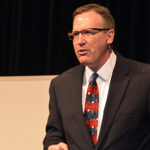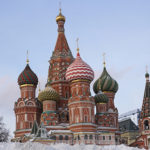WACO—American Christians who long for a return to the “good old days” of white male privilege should heed the warnings of the Hebrew Scriptures, biblical scholar and theologian Walter Brueggemann told a crowd at Baylor University.
People of faith must avoid the twin risks of amnesia and nostalgia—failing to recall foundational truths or holding too tightly to an idealized past, he insisted.
 Walter Brueggemann“Amnesia is forgetting too much. Nostalgia is remembering too much,” said Brueggemann, noted author and retired professor of Old Testament at Columbia Theological Seminary.
Walter Brueggemann“Amnesia is forgetting too much. Nostalgia is remembering too much,” said Brueggemann, noted author and retired professor of Old Testament at Columbia Theological Seminary.
Resist temptation of nostalgia
When people lose power and privilege—as the Jews experienced during their time of Babylonian exile—they tend to succumb to the temptation of nostalgia, he said. The Hebrew prophets’ writings should teach believers not to cling so tenaciously to the past they miss the “new thing” God may be doing, he asserted.
“‘Not to remember’ is important work among desperate people who remember too much, too long and too well at the risk of missing God’s newness that God is about to perform,” Brueggemann said.
“The reason I want to talk about this stuff is that I think white, male America is very busy at nostalgia for remembering a world that didn’t exist. And most of our political rhetoric is looking back at American greatness, an American growth economy and American exceptionalism.”
‘A past that never existed’
In exile, as illustrated by Psalm 137, the people of Israel longed for a return to a perfect Jerusalem that bore little resemblance to the imperfect city of economic injustice in which their ancestors lived, he noted.
Sign up for our weekly edition and get all our headlines in your inbox on Thursdays
“They remembered a Jerusalem that didn’t exist,” Brueggemann said. “They over-remembered. … Their displacement had given them a more perfect memory so that they screened out what was unseemly for the sake of certitude.”
Psalm 137 ends with an expressed hunger for vengeance, to be carried out even on Babylonians’ infant children, he noted.
“Excessive nostalgia for a past that never existed will lead to violence against those who have taken from us what we falsely remember—as in, ‘Make Jerusalem great again,’” he said.
‘Nostalgia feeds on loss’
Other Scriptures point to the Israelites’ desire to keep alive the memory of loss by “blotting out” those who caused their humiliation, Brueggemann observed. “Escalated nostalgia” makes the grievance even greater in retrospect than it was in fact, he added.
“Nostalgia feeds on loss,” he said. “It feeds on wounds that are never forgotten and therefore never resolved. Such a memory can be drawn on in every new circumstance because it is a continual call to arms.”
Mandates from the Hebrew Scriptures
Brueggemann called Christians to a “responsible hoping” that “entails a disciplined refusal of nostalgia” and presented three mandates based on Old Testament lessons:
- Forget old wounds that cannot be healed.
“That, of course, is an impossibility. But it is an impossibility made possible in the gospel,” he said. “Most of us are masters at nourishing old wounds we do not want blotted out.”
From the “lost cause” narrative of the Old South to the tragedies of Pearl Harbor and 9/11, some people continue to harbor old grievances and keep alive old animosities, he observed.
- Forget old monopolies of triumph.
Some Christian denominations and congregations live only to remember glory days from long ago, often based on the illusion of a lost “Christian nation” or nostalgic remembrance of cultural dominance, he noted.
“In displacement, the loss of triumph has produced a yearning—a homesickness for well-being that cannot be recovered,” Brueggemann said.
- Forget old claims of exceptionalism.
Both ancient Israel and modern America share a sense of “chosenness,” he observed. Love for one’s homeland must be tempered by the awareness people in other nations likewise love their countries and see themselves as chosen by God, he noted.
“Refusal and relinquishment are not easy,” Brueggemann admitted. “But the beginning point is to name them and face not only their claim but to recognize the capacity of those old memories to block alternative futures.”
Real loss should be mourned, and “narratives of pain” can create empathy, he observed. But people of faith should identify and release the toxic aspects of old memories, he urged.
“Old wounds to be forgotten are wounds perpetrated against the privileged,” he said. “Old wounds to be remembered and processed are committed against the vulnerable and the disadvantaged.”














We seek to connect God’s story and God’s people around the world. To learn more about God’s story, click here.
Send comments and feedback to Eric Black, our editor. For comments to be published, please specify “letter to the editor.” Maximum length for publication is 300 words.